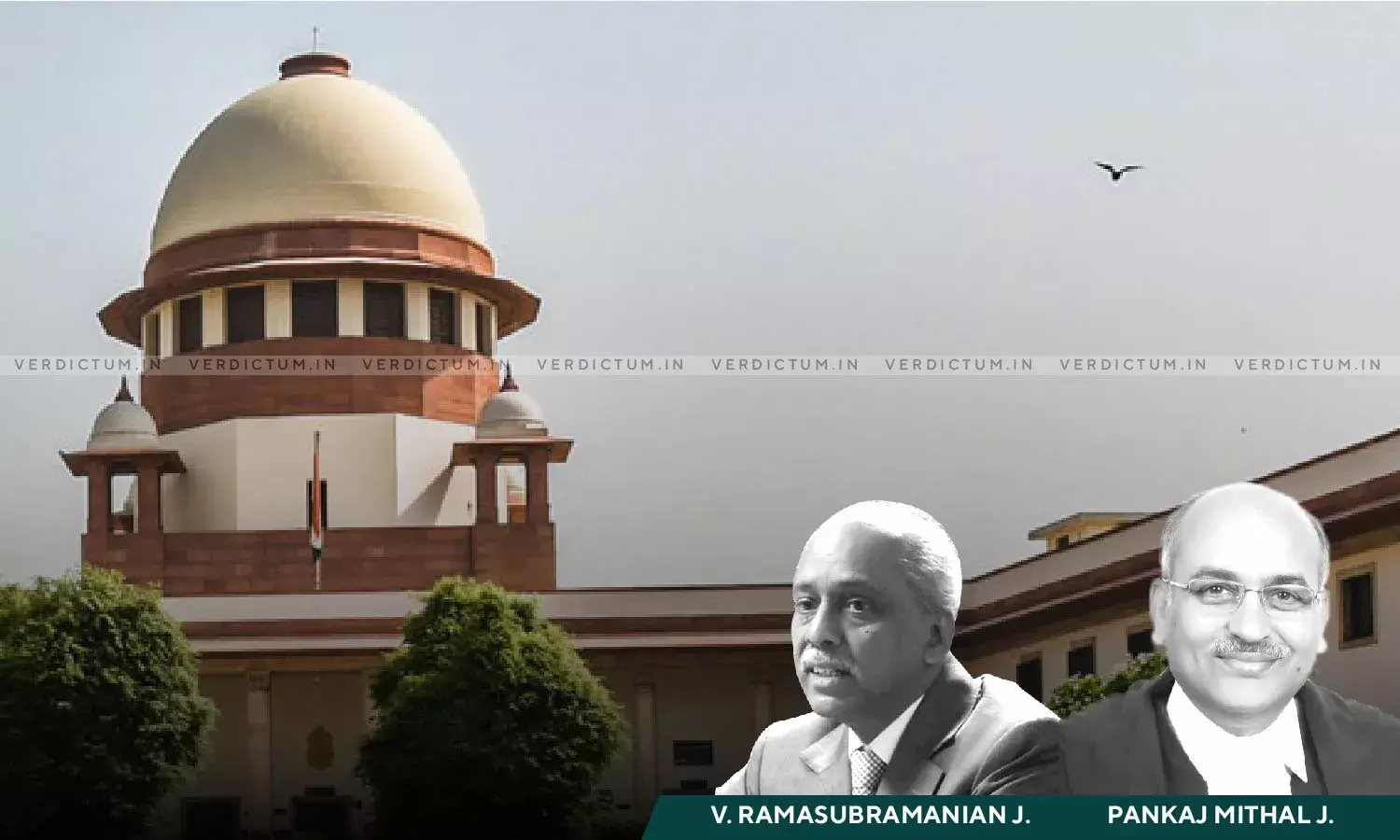Pronouncing Operative Part Without Preparing Judgment Is Unacceptable & Unbecoming Of A Judicial Officer- SC Observes

The Supreme Court while setting aside the order of the Division Bench of the Karnataka High Court, has upheld the penalty of dismissal from service for a Civil Judge on account of gross negligence and misconduct.
The Bench of Justice V. Ramasubramanian and Justice Pankaj Mithal observed that “...the charges which revolve around gross negligence and callousness on the part of the respondent in not preparing/dictating judgments, but providing a fait accompli, is completely unacceptable and unbecoming of a judicial officer.”
The Apex Court remarked that the High Court had created a new jurisprudence by stating that there should not be any further inquiry against the judge, while setting aside an order of penalty.
Senior Advocate Basava Prabhu S. Patil appeared for the appellant- High Court and Senior Advocate Anitha Shenoy appeared for the respondent.
In this case, the Special Leave Petition was moved by the Registrar General of Karnataka High Court challenging the order of the division bench of the High Court whereby the penalty of dismissal from service of a Civil Judge on account of gross misconduct was set aside.
The respondent was appointed as a Civil Judge (Junior Division) in January 1995. However, in January 2005, the respondent was suspended on allegations of gross misconduct. The enquiry reports revealed that some charges were proved while others were not.
Show cause notice was issued, and in October 2008, the Full Court of the Karnataka High Court resolved to impose the penalty of dismissal from service on the respondent judge. Based on the resolution, the Governor of Karnataka passed an order of dismissal from service in October 2008.
Thereafter, the respondent filed a set of three writ petitions to challenge the findings of the enquiry officer and a separate writ petition to challenge order of dismissal from service. However, all the petitions were dismissed. Subsequently, the respondent filed appeals aginst the order, which was allowed by the Division Bench.
The Apex Court said that the appeals were allowed by the Division Bench of the High Court by a very strange order, i.e., not only setting aside the order of penalty and the findings of the enquiry officer but also directing that no further inquiry can be held against the respondent.
The Apex Court said that the charges against the judge were of very serious nature where the respondent was alleged to have pronounced the operative portion of the judgment in open court without the whole of the judgment being ready.
Further, charges related to the conduct of auction sale of properties, seized during the investigation. These charges were very serious in nature and the reply given by the respondent to these charges was wishy-washy, said the Court.
The Court also said that the contention raised by the respondent that the stenographer’s lack of experience and inefficiency was responsible for the delay in preparing the entire text of the judgment, even after several days of pronouncement of the result in open court, could not be accepted.
“...But unfortunately, the High Court not only accepted this panchatantra story, but also went to the extent of blaming the administration for not examining the stenographer as a witness.” said the Court.
“A judicial officer cannot pronounce the concluding portion of his judgment in open court without the entire text of the judgment being prepared/dictated. All that the respondent has done in the departmental enquiry is just to pass on the responsibility to the inefficient and allegedly novice stenographer. We do not know how the findings with regard to such serious charges have been completely white-washed by the High Court in the impugned judgment.” remarked the Court.
Further, the Court also explained that while considering a challenge to an order of penalty imposed upon a judicial officer pursuant to the disciplinary proceedings followed by a resolution of the Full Court of the High Court, the Court was obliged only to go by established parameters namely, “(i) whether the charges stood proved; (ii) whether the findings of 12 the inquiry officer are reasonable and probable and not perverse; (iii) whether the rules of procedure and the principles of natural justice have been followed; and (iv) whether the penalty is completely disproportionate, especially in the light of the gravity of the misconduct, his past record of service and any other extenuating circumstances.”
The Apex Court held that unfortunately, the High Court did not test the correctness of the order of penalty in this case, on the above parameters. Moreover, the opinion of the High Court that the acts of omission and commission attributed to the respondent did not constitute grave misconduct, was very-very curious.
“Adding fuel to fire, the High Court has recorded in Paragraph 36 of the impugned order that “dismissing him from service itself is very atrocious”. Such a finding is nothing but a veiled attack on the Full Court of the High Court. After holding so, the High Court has gone to the extent of certifying the respondent as an innocent and honest officer. We do not know wherefrom the High Court came to such a conclusion.” said the Court.
Accordingly, the Court allowed the appeal, the order of the Division Bench was set aside, and the order of penalty imposed upon the respondent judge was upheld.
Cause Title- The Registrar General, High Court Of Karnataka & Anr. v. Sri M. Narasimha Prasad

